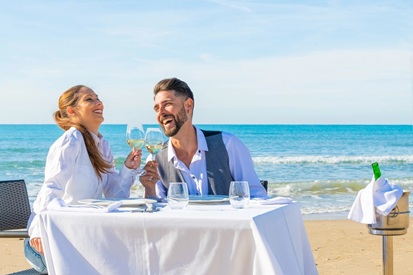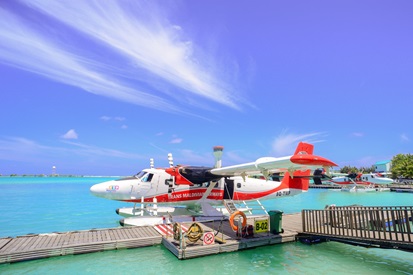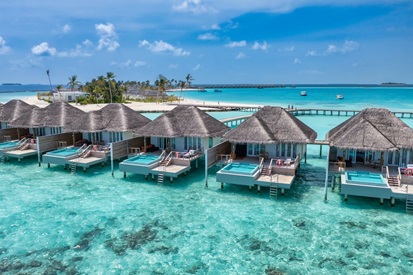

Everyone knows that the Maldives are paradise islands with fashionable resorts and turquoise water. But not everyone knows that this is a Muslim country where you can't bring alcohol or dogs, it is forbidden to relax in a bikini on public beaches outside the resorts, and you can only shoot with a drone with permission. We have collected all the interesting and useful information about the Maldives so that you are ready for your trip.

Depositphotos
Geography of Maldives in Facts
- The Maldives have about six times more islands than there are countries in the world! Yes, it is a scattering of small islands lost in the Indian Ocean.
- 99% of the Maldives is water. Of the total area of 90,000 square kilometers, land accounts for about 300 square kilometers.
- The Maldives consist of almost 1,200 coral islands. Nearby groups of islands are united into atolls. There are 26 atolls in the Maldives.
- Only about 200 islands are inhabited. More than a hundred more have resorts, and this number is constantly growing. The rest remain uninhabited corners of nature, although they are gradually being developed into new resorts.
- The capital Male is one of the smallest in the world (by area) and at the same time the most densely populated. Its area is only about 6.8 square kilometers, and more than 250 thousand people live on it!
- The closest neighbors of the Maldives are Sri Lanka (about 700 km) and India (about 400 km to the nearest islands).
- It is the lowest-lying country on Earth. The average height of the islands above sea level is only about 1.5 meters. For comparison, the average height of land on the planet is about 840 meters above sea level.
- Thanks to the barriers of coral reefs, the Maldives are protected from seasonal waves. Unfortunately, these reefs will not be able to withstand the rise in the level of the World Ocean caused by climate change. By 2050, almost 80% of the archipelago’s territory may simply become uninhabitable.
- The Maldives are building artificial islands. This is how the country is expanding and solving the problem of waste disposal.
- The country actively supports environmental initiatives: many hotels are developing sustainable practices, including programs to protect and restore coral reefs, and marine biologists in the state.

Depositphotos
History and Culture of the Maldives
The first people to make the Maldives their home are believed to have arrived on the islands over 3,000 years ago. Historians believe that Buddhists from Sri Lanka and seafarers from India were among the first settlers (from about the 5th century BC). Islam became the state religion in the 12th century.
The Maldives were once a "money" capital. In Africa, India, and parts of Ancient China, lightweight and unforgeable cowrie shells were used as currency. And the beaches of the Maldives were literally strewn with them. Their image can still be seen on Maldivian banknotes. The Maldives were under the influence of the Portuguese, Dutch, and English (they were a British protectorate), and only in 1965 did they gain full independence, of which they are very proud.

Depositphotos
Tourism in the Maldives
Just 50 years ago, tourism in the Maldives was practically non-existent. Despite the beauty of the archipelago, it was known mainly to diving enthusiasts. The first resort, Kurumba Maldives, opened in 1972 near Male. That year, only about 280 travelers visited the country. Before that, the Maldives were considered unsuitable for tourism: there was no airport, no developed infrastructure, or reliable communication with the outside world.
- The Maldives as a whole have their own unique concept: "one island - one hotel". Each hotel usually occupies an entire island. True, the islands are almost all small.
- In the 1980s, an infrastructure boom began: dozens of resorts were built, and the Velana International Airport was opened. Now tourism is the basis of the economy: more than 30% of the country's GDP is based on tourism.
- Particularly popular are the traditional Maldivian overwater bungalows, built on stilts directly in the lagoon.
- In the Maldives, everything is done in such a way that tourists on the resort islands rarely leave their territory, that is, on one island there is absolutely all the tourist infrastructure - restaurants, boutiques, water centers.
- For a long time, the Maldives were considered a destination for very wealthy travelers. However, since 2009, the government has allowed guest houses to open on local islands where locals live. Here you can relax on a more budget. But there are restrictions - a ban on alcohol and swimming in bikinis only on special beaches.
- Diving and snorkeling are the main activities. The Maldives are among the TOP-5 world diving destinations. In addition to corals, you can see manta rays and whale sharks here.

Depositphotos
Religion of the Maldives and All Related Nuances
The main religion in the Maldives is Islam, which has been the main religion since the 12th century. You will not see women sunbathing in bikinis on local beaches. The weekend on the islands starts on Friday, and Sunday is a regular working day. This is standard practice for residents of Islamic countries.
- All Maldivian citizens are required by law to be Muslims, and conversion to another faith is prohibited. This could result in loss of citizenship.
- Every inhabited island, even the smallest one, has at least one mosque.
- Local religious holidays depend on the lunar calendar, such as Ramadan and Eid al-Fitr.
- On the local islands, men and women dress modestly, with women often wearing a hijab. Tourists are also advised to cover their arms and wear knee-length shorts.
- There is no alcohol on the local islands. It is completely prohibited. Drinking alcoholic beverages is only allowed on the territory of resorts and hotels. The same applies to pork.
- Due to religious norms, importing dogs into the country is prohibited, even for tourists with pets.
- It is forbidden to photograph local residents without their consent, especially women and religious sites.
- Open displays of affection in public are not encouraged.

Depositphotos
What Language Do They Speak in the Maldives
In the resorts, English is enough, often even your only language. Most hotels have multilingual staff. But on the local islands, it is more difficult. The Maldivian language (Dhivehi) is unique and has its roots in the ancient Sinhalese language of Sri Lanka, with Arabic influences. You will also hear different dialects depending on which island or islands you visit. A couple of basic phrases are "assalamu alaikum", which means "hello" and "shukuriyyaa", which means "thank you". The locals call themselves "Dhivehi" and their country "Dhivehi Raji" (Kingdom of Dhivehi).

Depositphotos
Climate of Maldives
Eternal summer reigns here. The average annual air temperature fluctuates between +28 and +31°C. Even the nights are warm here, and the thermometer rarely drops below +25°C.
The Indian Ocean is ideal for swimming and sports all year round: the water temperature remains at +27...+29°C.
- There are only two seasons here, which depend on the monsoons.
- Iruvai - a monsoon that brings dry air (December to April), clear skies, and plenty of sunshine. Rain is rare, and the ocean is calm.
- Hulhangu - wet season (May to November): often heavy but short-lived tropical rainfall. Waves come.
- High humidity: 75-90% humidity all year round.
- Hurricanes and typhoons usually bypass the Maldives: the islands are conveniently located.

Depositphotos
Beaches of Maldives
The famous Maldivian white sand does not heat up in the sun. It consists of coral chips, not quartz. You can comfortably walk barefoot even on a hot day. Only 5% of all beaches in the world are made of corals, including the Maldives.
- Bikini Beach is what they call beaches on local islands. They are created for tourists so that they can swim in their usual swimsuits.
- On some beaches, the corals start almost right at the shore, which is great for snorkeling, but you need to be careful when entering the water.
- On the resort islands, the beaches are equipped with sun loungers, umbrellas, beach bars, and have a high level of service.
- The beaches of the local islands are simpler and more natural.

Depositphotos
What You Need to Know About Living in the Maldives
- Government offices, banks, post offices, and markets are open from Sunday to Thursday from 7:30 am to 2:00 pm-3:00 pm, with breaks for prayers.
- Large shops and supermarkets in the capital are open from 7:30 - 9:00 to 21:00 - 22:00.
- Tourist establishments and cafes usually open around 11:00.
- On Fridays, almost everything is closed, public transport does not operate - take this into account when choosing a hotel on islands far from the airport.
- It is difficult to find pharmacies on the islands, so take the necessary medications in advance.

Asad Photo Maldives
Food and Dining in the Maldives
Resort islands often offer a variety of meal plans, from breakfast (BB) to all-inclusive. Guesthouses usually include breakfast, and lunch and dinner can be eaten at local cafes or at the guesthouse itself. On local islands, there are small supermarkets and cafes, where lunch will cost an average of $10.

Depositphotos
House Prices in the Maldives
- Island resorts. The "one island - one hotel" format is the hallmark of the Maldives. Here you can choose a bungalow on the beach or an overwater villa on stilts. Private pools, personal butlers, world-class spas - this is all about paradise islands. The cost is from 200 to 5000 dollars and more per night.
- Guesthouses on local islands. This is a more budget option. There are hotels with swimming pools, inexpensive rooms from owners who rent out accommodation right in their home. There are both basic budget options and stylish boutique guesthouses. The cost is on average from 30 to 150 dollars to several hundred.
- Yachts and cruises (Liveaboard). This kind of life attracts divers who want to dive in different locations of the Maldives. This is life in comfortable cabins with meals on board, daily dives in the best dive sites. This way you can visit uninhabited islands and see the Maldives from a completely different side. The cost is from 150 to 500 dollars and more per night per person.

W Maldives
Taxes and Fees in the Maldives
Please be prepared for the fact that the indicated room rate will be added to the service charge (usually 10%) and the government Goods and Services Tax (GST), which is 16%. There is also an environmental tax (Green Tax) - $6 per person per night at resorts and $3 in guesthouses.

Depositphotos
Transfer in Maldives
The Maldives are surrounded by water. Therefore, people move around here by water and air.
- Ferry: The cheapest option is the local ferry, which can take you for a couple of dollars to many of the islands within the atoll.
- Boat: A more expensive and more comfortable option. There are regular boats that transport you to local islands, as well as private transfers to resorts.
- Seaplanes: This is the most expensive type of transfer in the Maldives.
- Domestic flights: Help to quickly move from Male to remote atolls.
Please note that the cost of the transfer is usually not included in the price of accommodation and can be significant. Wiotto reflects the full cost of the holiday with transfers, without hidden payments. Contact the online chat on the site, and our manager will explain all the details on this issue.

Asad Photo Maldives
Cultural Features of the Maldives
The culture of the Maldives was influenced by Arabic, Indian, African, and Sinhalese traditions. Bodu Beru is one of the most famous national dances on the islands. It is performed to the accompaniment of drums with African roots.
The coconut palm is the main raw material here. It is used to make utensils, souvenirs, boats, and, of course, valuable food products.

Nova Maldives
Interesting Facts About Maldives
- The Maldives is the only country where you can send a postcard from an underwater post office (for example, at the Conrad Maldives Rangali Island hotel).
- The Maldives became the first country to have underwater restaurants.
- There is a unique beach in the Maldives where the sea turns into a starry sky. This is Vaadhoo Beach on the island of the same name. Here you can witness an amazing natural phenomenon - the bioluminescent glow of plankton. The sea at night seems to be strewn with twinkling lights!

Asad Photo Maldives
Things to Do in Maldives
This is a key question worth exploring. Often tourists decide to spend their vacation simply at their resort. Even if you decide not to leave the island - you will have something to do. But also many resorts organize excursions for their guests.
Snorkeling in the Maldives
Snorkeling is the simplest thing you can do - go snorkeling. Meet the colorful inhabitants that live on the reef. You might even meet manta rays and small reef sharks! If snorkeling is your thing, choose an island resort with a good house reef.

Depositphotos
Diving in the Maldives
Scuba diving to the reefs is a must in the Maldives. Diving in the Maldives is one of the best in the world! If you do not have such experience, you can take a short training course and dive into the Indian Ocean with its incredible biodiversity. Try night diving: an extraordinary experience, because everything is presented in a completely different light! The atolls of Male, Ari, and Baa are especially popular with divers. In Baa, snorkeling safaris to the Hanifaru Nature Reserve, which is under the protection of UNESCO, are very popular.

Depositphotos
Water Fun
- A glass bottom kayak to explore the lagoon. Beauty both under and above water! Or you can rent a mini catamaran to ride around the lagoon.
- Water sports - flyboard, jet skis, kitesurfing, parasailing, windsurfing, SUP surfing.
- Surfing. From April to October is the best time to catch a wave. Many surfers come here for the season. Top spots: Himafushi, Thamburudhoo. There are also surf tours from Male.
- Fishing. Catch the most magnificent trophy of your life. This is the land of tuna, grouper, and blue marlin. How about night fishing on a dhoni boat? The chefs will cook your catch in a luxurious restaurant.
- Dhoni boat trips. A traditional Maldivian boat will take you between the islands - for snorkeling, to see dolphins, or just for a sunset cruise.
- Underwater odyssey on a submarine. Dive into the ocean and watch whales, dolphins, and other sea creatures without scuba gear.

Depositphotos
Other Entertainment
- Leisure at the hotel. Hotels often act as organizers of leisure activities for guests on the island - these are traditional Maldivian dances, theme nights in restaurants, karaoke, and discos. For a cultural experience, you can go to a local island nearby to see how the native Maldivians live outside the resorts.
- Male. If you have chosen a hotel near Male, do not miss the opportunity to go on a tour of the capital or go there on your own - for shopping, or just walk around the only city of the Maldives and be amazed by its color.
- Flight over the Maldives. The scattering of islands in the middle of the ocean is worth seeing from a bird's eye view. If your transfer to the hotel was by water, book a flight on a seaplane - the views are simply magical!
- Maldivian Spa. The best spas in the world are in the Maldives. There are even underwater salons! Try papaya wraps or Ayurvedic treatments. Choose from the best spa hotels in the Maldives.
- Yoga with an ocean view. The Maldives is a land of retreats. Yoga classes are held in pavilions, on rooftops, or even on a SUP board in the middle of the ocean. Check out Maldives hotels that offer yoga.
- Entertainment for children. Family hotels have children's clubs with animators, so that parents can enjoy their holiday while the children are under supervision.

Depositphotos
There is much more to say about the Maldives, but it is better to see it once! In the Wiotto catalog, you will find a huge selection of hotels on the best beaches of the Maldives for any budget.
More articles
- Mauritius in Winter: Weather and Top Attractions
- Samosir Island in Sumatra: All About Vacationing
- The Maluku Islands in Indonesia: All About Vacations
- 10 Unique Facts About Indonesia
- Karimunjawa Island and National Park in Indonesia
- Indonesia's Natural Attractions: 13 Places Worth Seeing
- Nusa Dua in Bali: The Best Hotels and What to Visit
- Comment organiser un voyage aux Seychelles : 5 points clés
- Mentawai in Indonesia: All about the islands, how to get there, where to stay, and entertainment
- How much does a holiday in Mauritius cost – accommodation, food, and entertainment?



